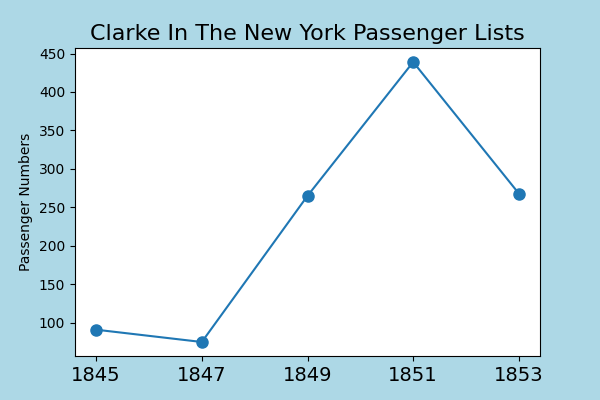This article looks at how common Clarke is as a last name in Ireland and the United States from the 19th century to the present day.
You’ll learn the meaning and origins of the Clarke surname while exploring some notable and famous people that held it.
I use census records, emigration lists, and military archives to uncover fascinating patterns. If you’re studying your genealogy, check out my sources at the end of the post so you can do your own research.
How Common Is Clarke As A Surname In Ireland?
Ireland does not disclose current statistics on surnames in much detail. The most that we get is the top ten last names in birth registrations for the previous year. Clarke doesn’t have enough numbers to appear in this top ten.
However, an Irish genealogist studied the top one hundred surname numbers in Ireland between 1992 and 1997. Seán Murphy based his research on telephone books. This isn’t as accurate as a census but gives a good approximation.
Clarke was ranked 27 in the top one hundred names in this decade with a total of 19,000 entries.
This graphic shows how it ranks compared to the 1st, 33rd, 66th, and 100th entries in the survey:

Clarke In The Early 1900s
The only complete Irish censuses that are available to the general public are those from the years 1901 and 1911. They offer two detailed snapshots of the population.
So, let’s focus on the early 1900s.
I used online archives to calculate the total numbers by surname. I consider these estimates due to some percentage of transcription errors. So, I’ve rounded the numbers to the nearest fifty.
There were 14,100 residents named Clarke on the island in 1911.
Ten years earlier, Clarke had about 13,500 residents in the 1901 census.
Population Estimates In The 1890s
A study of Irish surnames was conducted in 1890 by the head of the Civil Registrations Office. It was published as a “Special Report on Surnames In Ireland.”
The survey estimated that there were about 15,400 people named Clarke in the country.
Emigration To America After The Irish Famine
The Irish have historically emigrated to Britain, the United States, Canada, and Australia. They were motivated by multiple factors, including social unrest, economic desperation, and hunger.
The largest wave of emigration to the United States occurred during the 19th century. The peak was in response to the Great Irish Famine, which took place between 1845 and 1852. A plant disease devastated the main food and income crop for much of the population.
I reviewed the Clarke name in the shipping passenger lists arriving in New York during this period. The departures were from both Ireland and England.
The graph below shows how the numbers rose and fell in the years after the famine. You can see how the number peaks after six years of hardship.

With that explanation out of the way, let’s look at how Clarke ranks in America.
How Common Is Clarke In The United States?
Based on the 2010 U.S. census, the name Clarke ranks about 487 among Irish names in America with 68,281 bearers.
Although the 2010 census has exact numbers and rankings, the rank I assign here is my estimate. If you’re curious about how I got there, here’s a brief explanation…
Estimating Rank In The United States
Historically, some Irish families with Gaelic surnames took English-sounding names as translations under the influence of colonization.
As these names also have English origins, they will have been brought to the United States by both British and Irish immigrants. Because the census doesn’t ask about specific European origin (e.g. England vs Ireland), it’s impossible to identify the proportion with Irish heritage.
I reviewed the census to identify which names are predominantly Irish in origin. In order to estimate the relative rankings of “Irish” names, I’ve mostly excluded surnames that have varying origins.
Clarke In Historic Census Years
It is fascinating to examine how the prevalence of a surname shifts over the course of time in a country as young as the United States. As well as immigration, this reflects other demographic shifts across the nation. Factors include higher child mortality rates and longer life expectancy.
The historic census records have been transcribed and digitized. I used online archives to run counts of surname populations.
But the totals can’t be exactly accurate due to transcription errors. So, I’ve rounded the numbers to the nearest 50 in the graph below.
This picture shows the numbers every twenty years from 1860 to 1940:

These are the numbers in the graph:
- 1860: 9,050
- 1880: 13,600
- 1900: 18,850
- 1920: 25,700
- 1940: 30,750
Clarke In World War II
During World War Two, approximately 8.3 million men and women joined the ranks of the United States Army. Many were of Irish descent. Some had even been born in Ireland and emigrated.
There were registration records for 1,956 soldiers named Clarke who enlisted between 1938 and 1946.
There were 19 who were born in Ireland.
Clarke Surname: Meaning And Origin
The surname Clarke has separate origins depending on English or Irish heritage. In England, the name referred to someone who could read and write.
The Irish name is an anglicization of two Gaelic surnames.
Ó Cléirigh is a direct translation that means “descendant of the clerk”. Ó Cléireacháin means “descendant of the cleric” i.e. the family of a religious person.
Famous Or Historic People Named Clarke
Here are some notable people with the family name:
- Tom Clarke (1858-1916): one of the main leaders of the Easter Rising in 1916, he was executed by firing squad.
- Austin Clarke (1896–1974): a renowned poet from Dublin whose work was lyrical. The Planter’s Daughter is one of his best-known poems.
More Irish Names Beginning With C
Sources

External Research
The Ireland 1990s estimates are from Seán J. Murphy’s research paper.
The population estimates of 1890 are based on the “Special Report on Surnames in Ireland“, published in 1909.
The population figures for the 2010 U.S. Census come from a file provided by the U.S. Census Bureau.
Internal Research
Some of the population numbers are based on my own research and calculations using online archives. I’ve rounded those numbers to the nearest 50 to account for transcription errors and other technical issues with online databases of this type.
The Irish census estimates for 1901 and 1911 are my calculations based on the Irish National Archives
I plotted the emigration figures from 1845 to 1854 based on calculations from the archives of the New York Passenger Lists (1820-1957).